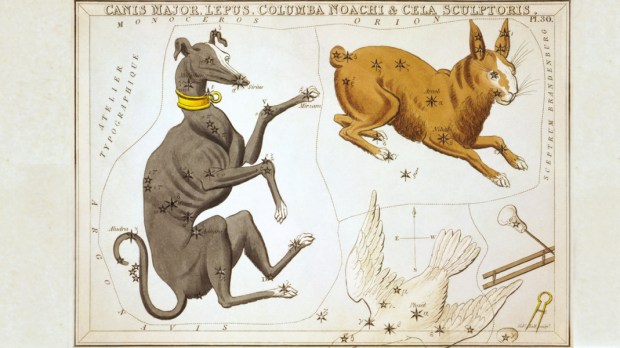Calling the hottest days of summer “dog days” has more to do with astronomy than with panting dogs lying on the porch. We owe the expression to the Ancient Roman wit.
Our “dog days of summer” are almost a literal translation of the Latin “dies caniculares,” which would correspond to the days in which the “dog star,” Sirius, appear to rise just before the sun, often in late July. These days would be not only the hottest in the year, but were also associated to disease – most likely thanks to the proliferation of flies — and potential catastrophes, or even war.
Sirius, the dog star, belongs to the Canis Major constellation, which chases the Lepus (hare) constellation at the heels of the hunter, Orion. In fact, Sirius is the dog’s nose. Both Greek and Roman literature are filled with references to “Orion’s dog rising.” For instance, in Homer’s Iliad, Achilles’ march unto Troy to slay Hector is thought of as an effect of the star’s appearance in the summer skies:
Priam saw him first, with his old man’s eyes, A single point of light on Troy’s dusty plain. Sirius rises late in the dark, liquid sky On summer nights, star of stars, Orion’s Dog they call it, brightest Of all, but an evil portent, bringing heat And fevers to suffering humanity. Achilles’ bronze gleamed like this as he ran.
But, even if we admire the classic wit, sometimes the hottest days of the year do not correspond to Sirius’s rise. Even if July and August are indeed the hottest months of the year (at least in the Northern Hemisphere, that is), the hottest period can vary on a yearly basis, also depending on your latitude. As explained in an article published by NatGeo, this year in Athens Sirius rose around the middle of August. Farther south, it rose earlier. In the Northern Hemisphere, it will happen by the end of the month (so brace yourselves, heat is coming).
The reason is quite simple: the movement of the stars in our night sky is independent of our calendar seasons. NatGeo explains:
“Our Earth is like a spinning top,” said Bradley Schaefer, professor of physics and astronomy at Louisiana State University. “If you toss it onto a table, after it slows down … the pointing direction of the top will slowly go around in circles.” Similarly to a top, “the Earth’s rotation is kind of wobbling around.” “The calendar is fixed according to certain events, but the stars have shifted according to the way that the Earth wobbles,” said Larry Ciupik,astronomer at Adler Planetarium and director of the Doane Observatory. “So in about 50-some years, the sky shifts about one degree.”
This means in a few thousand years, “dog days” won’t even happen during the northern summer.

